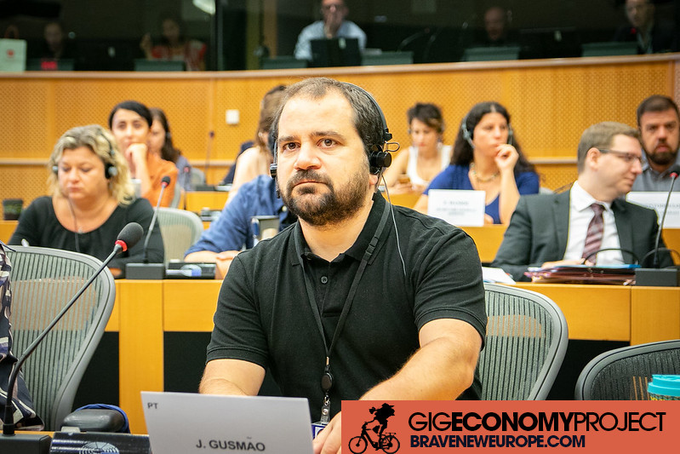The EU Parliament’s new recommendations on employment protection guidelines are a “complete reversal” of the positions “that have dominated the European institutions for years”, according to its architect. However, the vote is not binding on European institutions. The Gig Economy Project takes a look at the resolution and what it could mean.
Ben Wray is a freelance journalist leading BRAVE NEW EUROPE’S Gig Economy Project. He also produces a morning newsletter called Source Direct on Scottish politics, which you can sign-up to here: https://sourcenews.scot/mailing-list/
This series of articles concerning the Gig Economy in the EU was made possible thanks to the generous support of the Lipman-Miliband Trust
![]()

Picture by GUE/NGL.
The European Parliament voted for a resolution on Friday [10 July] recommending the EU Commission to draw up far-reaching reforms to EU Employment Guidelines, including the recognition of gig workers rights like any employee.
The resolution, which was brought forward by José Gusmão, an economist who is a member of Portuguese party Left Bloc and on the European Parliament’s Employment and Social Affairs committee, was passed with 550 voted for, 128 against and 10 abstentions.
“The report on the employment guidelines adopted today shows a complete reversal of the positions that have dominated the European institutions for many years,” Gusmão said, after the vote. “In a context in which the problems caused by the Covid-19 pandemic are further aggravated by precarious employment relations and the deregulation of the labour market, this report proposes an alternative path that is as clear as it is urgent.”
The adopted resolution is not binding on EU institutions. It is the basis of “specific recommendations” for the forthcoming EU Employment Guidelines which will be decided by the EU Commission, a non-elected body, and ratified by the EU Council, which is made up of the heads of member-states. The Guidelines form part of the ‘the European semester’ which is the basis for EU economic rules upon member-states. Specific employment laws are decided at the member-state level, but legally must operate within EU Treaty laws on employment (Article 148 of the TFEU).
“It is good to have good news coming from Europe,” Gusmão added. “I hope that this report, and the broad support it has had in Parliament, will enable us to reverse the trend and start to implement measures to combat poverty and recover levels of job protection that are essential, as the Covid crisis is showing.”
Leila Chaibi, France Insoumise MEP who is also on the European Parliament’s Employment and Social Affairs Committee, said of the vote: “European Parliament votes to extend collective bargaining to platform workers! This result is a considerable advance in the fight for recognition of their employee status and the rights that go with it.
“After hard work within the institutions, the large majority obtained by this report is a solid basis for putting an end to the growing insecurity of these workers”.
Chaibi added that the resolution was “not an end in itself”, but would help in “forcing the French Parliament to recognise workers as wage earners with all the rights and social protection that go with them.”
“The decisive legislative proposal will come in a few months,” she explained.
The resolution states specifically that: “Employment relationships that lead to precarious working conditions and wage competition should be prevented, including in the case of platform workers.”
It adds: “There should be no abuse of atypical contracts. Member States should ensure that all these workers genuinely enjoy fair working conditions, social rights and access to adequate social protection and improved representation.
“To that end, Member States should fully implement the International Labour Organisation’s 1947 Convention on Labour Inspection and invest in effective labour inspections by sufficiently empowered competent authorities and coordinate and cooperate within the framework of the European Labour Authority their efforts to combat cross-border abuse.
“Access to effective and impartial dispute resolution and a right to redress, including adequate compensation, should be ensured in cases of unfair dismissal.”
Elsewhere, the resolution calls for member-states to “respect and strengthen the social partners and extend collective bargaining coverage”, and to “tackle all forms of precarious work and bogus self-employment, and ensure that employment relationships stemming from new forms of work are in line with Europe’s social model”. It also calls for minimum wage rates to “take into account productivity developments to fight against precariousness and in-work poverty”.
The resolution comes after the EU Commission was accused by unions of delaying labour reform which would ensure protections of gig workers. The Commission announced a process on 30 June to correct flaws in EU Competition Law which allows some member-states to prohibit collective bargaining rights for freelance workers and the self-employed. The process would “need years of debate”, according to the European Trade Union Confederation’s General Secretary Luca Visentini.
“The solution is easily available,” Visentini said. “The EU should confirm the correct interpretation of EU Competition Law to fully exclude collective agreements from the remit of Article 101 TFEU and national competition rules. It does not need years of debate, and does not need to be linked to fixing a whole range issues on digital services.”
Gig workers have been hit particularly hard hit by the pandemic crisis, with a study by the AppJobs Institute finding 89 per cent were looking for new sources of income during the crisis, while 50 per cent of all platform workers have stopped working during the crisis, according to a study by the Fair Work Foundation.


Be the first to comment